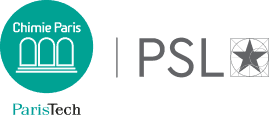Faced with global scientific, technical and societal challenges, the school is strongly developing its European and international relations in order to provide its students, teachers, researchers and staff with the necessary tools to contribute to the solutions of tomorrow.
In terms of research, Chimie ParisTech is developing a proactive policy to support collaborative project repositories by setting up a shared department within PSL in 2018.
Three ERCs are currently underway, as well as two training networks (Marie Curie networks) and six Horizon 2020 collaborative projects.
In addition, the school has received FEDER funding to develop its incubator: Chimie Paris Innov. These funds were used to renovate premises and make them suitable to hosting start-ups. Through their contacts with other PSL incubators, Chimie Paris Innov has already hosted 4 start-ups in 2018.
To learn more about Chimie Paristech incubator
To learn more about PSL incubators
International support structures
Thanks to its close cooperation with the CNRS, Chimie ParisTech participates in 2 International Associated Laboratories (LIA), which have very close links between the research teams.
LIA – IrMaCaR – Iron and Manganese Catalyzed Reactions.
Created in 2014 and renewed in 2019 it involves the Ludwig Maximilians University (LMU). This cooperation brings together specialists in organometallic chemistry oriented towards organic synthesis, especially homogeneous catalysis.
The objective is to develop research that will lead to a better understanding of the mechanisms of reactions catalyzed by iron or manganese. The ultimate objective is to develop new synthesis methods as an alternative to the reactions that are now being catalyzed by expensive and/or toxic transition metals.
To learn more on cahiez-researchgroup.fr
LIA – SMOLAB – Small Molecule Lab.
Created in 2018, it involves the Kyoto University. The objective of this cooperation is to concentrate and reinforce complementary forces of international reputation in France and Japan in the field of Porous Coordination Polymer (PCP) and their applications. This highly-scientific partnership involves leading researchers in Japan and France at the IRCELYON (Institute for Research on catalysis and the environment of Lyon) and the IRCP (Research Institute of Chimie Paris). This partnership is also supported by the Air Liquide Group to monitor its resulting industrial developments.
